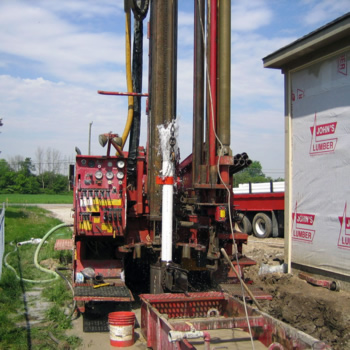 How Does Water Well Drilling Work?
How Does Water Well Drilling Work?
Residential contractors are typically the first to experience a water well drilling, but many homeowners also look into a water well for a home renovation, and to improve their relationship with their water. The main reason why homeowners turn to their own water well is if they live in a farm or rural area, and have to go through a water delivery system for their everyday water needs. Whether you are buying a home already with a well, building a new home, or drilling a new well at your current home, you should know what goes into a well, and how you need to maintain it and treat it for water quality.
How Long Does it Take to Install a Residential Water Well?
The process for adding a residential well starts with deciding the best location for it on your property. This is a decision made between the homeowner and the well drilling professionals. Once decided, the well can be delivered to your home in as little as one day, and it can take up to about four days. Before the well can be used as a source for drinking water, it must first be tested by the drilling company, in which they take samples to detect the quality of the water. These samples have to be taken back to the lab for testing before the homeowners can be told that the well water is ready for consumption. The testing typically takes about 24-36 hours to complete.
What Type of Testing And Maintenance is Required?
Once the well has been installed, a testing of the water is required. Water well drilling professionals also recommend testing for bacteria once annually to ensure the well itself remains structurally sound and does not experience deterioration over time. It is also strongly recommended for homeowners to have their well tested if they see any changes in color in the water, or a change in its taste or smell. Some structural maintenance is also required over the lifetime of the water well. Well drilling companies recommend a physical inspection of the well about every five years, even if there isn’t any obvious changes in water quality or pressure. This type of testing will ensure no major issues arise out of the blue, and if there is a small problem detected, it can be taken care of right away.
Does Any Purification Need to Happen?
Even with water quality testing, many wells still need to go through a purification process. This purification is given because much of the country’s soil contains a high amount of iron, and this particular mineral can cause staining on toilets, bathtubs, pipes, and faucets where the well water comes out of. While the water quality testing is for testing the drinkability of the water, this purification is to prevent household staining. Even if soil iron levels are low, most water wells still need purifiers to take care of hard water, which is water that contains calcium and magnesium. Hard water can cause a white, chalk-like buildup of staining in a dish washer, and on shower doors, and reduces the effectiveness of household cleaners.
Consult with an Oakland County Residential Well Drilling Professional
A residential water well is a great solution for many homeowners, and if you live in a rural area with little access to a water supply, contact the water well drilling professionals at Ries Well Drilling to start the process today. Call: 586-784-9516
